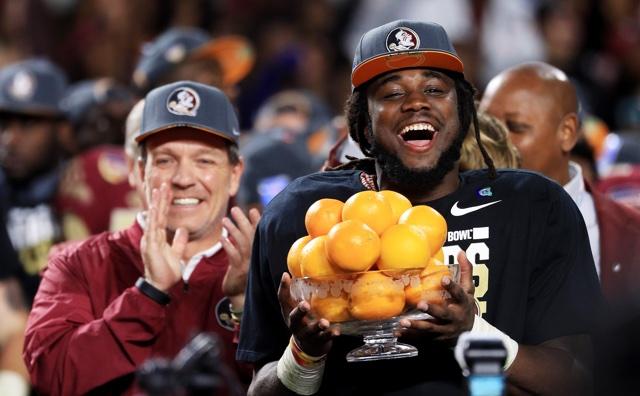It's one week before the NFL Draft, which means it's also Wonderlic leak season.
Wonderlic scores are meant to remain private within the NFL scouting community, but the results of high-profile players are almost always spread. Bob McGinn of the Milwaukee Journal Sentinel wrote a story Wednesday that included the Wonderlic scores of running back prospects Leonard Fournette and Dalvin Cook with each getting 11 out of 50.
ESPN sports business reporter Darren Rovell tweeted those scores Thursday to his 1.77 million followers, and he got flak for it. Rovell only cited the two lowest scores from McGinn's story but used average scores for various other jobs as a frame of reference. ESPN colleague Bomani Jones called Rovell out for "Wonderlic shaming."
Leonard Fournette & Dalvin Cook got 11's on their Wonderlic, per @BobMcGinn. Here's an occupational comparison chart pic.twitter.com/38jf3AX7RE
— Darren Rovell (@darrenrovell) April 20, 2017
wonderlic shaming is wrong, man. stop it. https://t.co/d0xCc6DfNz
— El Flaco (@bomani_jones) April 20, 2017
Sure, Rovell could have framed Fournette's and Cook's low scores in better context, but if he did not tweet about them, someone else would have anyway once McGinn's article was published. Fans will Google search "Leonard Fournette Wonderlic Score" for as long as he plays in the NFL.
Whether you believe the Wonderlic Test is a necessary tool for NFL teams is irrelevant to this column. Let's talk about the players who might have scored an 11 on the Wonderlic and are not going to the NFL.
Leonard Fournette and Dalvin Cook will be all right. Two of the top running backs on the board, the former LSU and Florida State stars will be part of an NFL team in less than a week. Sponsors are already tugging at their pads, and they are about to become very rich men.
In the grand scheme, their Wonderlic scores will not matter. But if their college teammates with no pro prospects are also scoring an 11 on the Wonderlic, that is a problem. It means the college football system is not working.
The tradeoff of playing college football is not pay, but free education -- allegedly. A 2012 CBS News study showed among custodians/janitors, only 5 percent had four-year degrees. Heavy truck drivers also included a sample with 5 percent having college degrees. According to Rovell's list, the average Wonderlic score for these two jobs is 14 and 18.
While Fournette and Cook only attended three years of college and did not graduate, their scores are far below where the baseline should be for a three-year student at respected institutions such as LSU and Florida State. But again, they'll be all right. As for their teammates, who may not have the skills to make the NFL or suffered an unfortunate injury while in college, lack of education could be a significant problem moving forward.
Don't shame the players. Shame the schools, shame college football, shame the process. According to a 2013 study by the University of South Carolina, FBS players who entered college in 2015 "graduated at rates 18 percentage points lower than non-athletes, and black athletes lagged by 24 percentage points" (H/T Kevin Trahan in SB Nation). The conferences with the widest gaps: the five major FBS Conferences.

Should college football players be paid? Should high school players be allowed to go to the NFL? That is not what we're discussing here. For the time being, players are directed to universities that feature some of the highest endowments in the nation. (A 2015 list of the to 25 universities by endowment in the world included 15 FBS programs). The justification is that at the minimum, these individuals will garner an education from the experience.
Fournette and Cook's scores suggest otherwise. Did Fournette and Cook probably slack off in studying because their NFL draft potential was so high? It's likely. But that is part of why colleges spend millions of dollars on administrators, professors and advisors: to keep students on a path toward education.
A significant portion of elite high school prospects do not come to college to "play school." But according to their scholarships, that is the deal. Student-athletes practice during the week, play games on the weekend and study in between. The player promises to wear the school's colors on Saturday and the school promises to provide an education.
Taking Fournette and Cook's scores for what they are worth, these three-year college students scored lower than the average custodian, a job which features only 5 percent college graduates (from any four-year program). So, the colleges, not the players, failed in this relationship.
NCAA and NFL, you don't want to pay college players or send them directly to the pros from high school? Fine. Then do your job and educate them. If you don't, what's the point?
-- Follow Jeff Eisenband on Twitter @JeffEisenband. Like Jeff Eisenband on Facebook.





